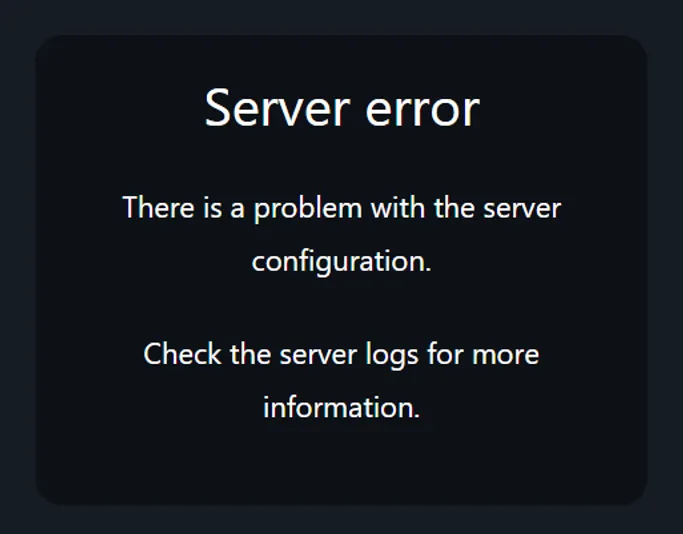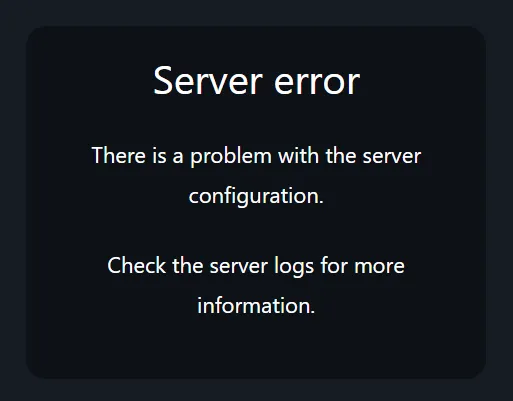
Passing user-friendly NextAuth v5 error messages to the client
In Auth.js v5, you can only pass a custom error message to the client if it's thrown from CredentialSignin's `authorize` function. Here's a workaround for OAuth providers and session/JWT callbacks.
⚠️ Auth.js v5 is still in beta, so the APIs covered in this article are subject to change.
Note: The Next.js package for Auth.js is still called NextAuth. The code examples in this article use NextAuth, but my solution will likely work on other frameworks that Auth.js supports, like SvelteKit, SolidStart, and Qwik.
Background
Recently, I was building a Next.js app with NextAuth. I had to add an OAuth provider with an additional authorization check. However, if the authorization check failed, I found that the client received this obscure error message:

This is hardly user-friendly, so I tried to throw a custom error in my authorization handler:
import { type JWT } from "@auth/core/jwt";
import NextAuth, { type User } from "next-auth";
import Google from "next-auth/providers/google";
import { getUserInfo } from "some/example/library";
export const { auth, handlers, signIn, signOut } = NextAuth({
providers: [Google()],
callbacks: {
async session({ session, token }) {
if (token.user) {
// Pass the `user` field from the user's JWT to their session,
// allowing us to access it with the `auth()` function or via `useSession()` on the client.
session.user = token.user;
}
return session;
},
async jwt({ token, account }) {
if (account) {
// `account` is only present on the initial login.
try {
// Fetch some data from an external service that should be attached to the user's JWT.
// Don't do this with data that you expect to change while the user is signed in!
// You will have to re-issue a new JWT every time it changes.
const userProfile = await getUserInfo();
return {
...token,
user: userProfile, // Add the info to the user's token
} satisfies JWT;
} catch (error) {
// Rethrow with a user-friendly error message
throw new Error(
"We couldn't find your profile. Please contact us if the error persists."
);
}
}
},
},
});
declare module "@auth/core/types" {
interface User {
// Augment the User interface with some custom data
userInfo?: any;
}
}
declare module "@auth/core/jwt" {
interface JWT {
// Add a user field to the JWT so that the information can be transferred to the session
user: User;
}
}However, my new error message wasn’t being displayed.
I did some research and came across this GitHub issue
about passing errors to the client from a credential provider’s authorize handler.
The only difference between their situation and mine was that I was using a jwt handler on the user’s first login
instead of implementing my logic with a credentials provider, and
the issue’s proposed solution and
its eventual implementation didn’t support that use case.
The Solution
Note: If you are using a credentials provider and your error-prone logic is in the authorize callback, see this pull request for a built-in solution.
My idea was to add a field on the token when an error occurs that can be checked in middleware or on the client. Here’s how you can replicate this in your own app.
First, if you’re using TypeScript, augment the JWT and Session interfaces:
// This can be anything, just make sure the same type
// is used in both the JWT and Session interfaces.
type CustomAuthError = string;
declare module "@auth/core/types" {
interface User {
// Augment the User interface with some custom data
userInfo?: any;
}
}
declare module "@auth/core/jwt" {
interface JWT {
user: User;
error?: CustomAuthError;
}
}
declare module "next-auth" {
interface Session {
error?: CustomAuthError;
}
}Passing The Error to The Client
Then, in your jwt callback, set an error property on the user’s token when an exception is thrown:
// This function should be in the `callbacks` object in your Auth.js config.
async function jwt({ token, account }) {
let error: CustomAuthError | undefined;
try {
// Some code that could throw an error
const userInfo = await getUserInfo();
} catch (e) {
// For example:
if ("status" in e && e.status === 401) {
error = "You are not allowed to access this application.";
} else {
error = "There was a problem signing you in.";
}
}
return {
...token,
error,
} satisfies JWT;
}Finally, in your session callback, pass the property from the user’s token to their session:
// This function should be in the `callbacks` object in your Auth.js config.
async function session({ session, token }) {
if (token.user) {
session.user = token.user as User;
}
if (token.error) {
session.error = token.error;
}
return session;
}Note: The rest of this guide is Next.js-specific, but the concepts are very similar in the other frameworks that Auth.js supports.
Retrieving and Displaying The Error (Next.js-specific)
Now, you can access the error from the client or in middleware. Here’s a Next.js middleware example:
import { auth } from "./auth.ts";
export const middleware = auth(async (req) => {
// `req.auth` is populate with the user's session when using
// the NextAuth middleware wrapper
if (req.auth?.error && req.nextUrl.pathname !== "/auth/error") {
// Redirect to a custom error page.
const newURL = req.nextUrl.clone();
newURL.pathname = "/auth/error";
// For example, you can use the error as a URL parameter:
newURL.searchParams.set("code", req.auth?.error);
return NextResponse.redirect(newURL);
}
});
export const config = {
// Side note: you can save middleware invocations by configuring it to not run on static files and API routes.
// See https://nextjs.org/docs/app/building-your-application/routing/middleware#matcher
matcher: ["/((?!api|_next/static|_next/image|favicon.ico).*)"],
};Learn more about Auth.js middleware for Next.js in their official docs.
⚠️ If you create a custom error page as shown in the middleware example, make sure to sign the user out when they visit it! Otherwise, you may accidentally create an infinite loop that prevents the user from making another sign-in attempt.
If you want to access it on the client, you can write a component like this:
"use client";
import { signIn, useSession } from "next-auth/react";
import { useEffect } from "react";
export const SessionErrorHandler = () => {
const { data: session } = useSession();
useEffect(() => {
if (session?.error) {
// If an error is present, do something with it.
// For example, you can display it to the user...
alert(session?.error);
// ...or immediately redirect them to your sign in page.
signIn();
}
}, [session]);
return null;
};You can use this as a normal React component in your root layout:
import { type ReactNode } from "react";
import { SessionErrorHandler } from "../components/SessionErrorHandler";
export default async function RootLayout({
children,
}: {
children: ReactNode;
}) {
return (
<html>
<SessionErrorHandler />
<body>{children}</body>
</html>
);
}Final Note
After writing this, I realized the NextAuth developers used the same pattern in their documentation!
In the section about handling Google refresh tokens,
if there was an error refreshing the user’s access token, the jwt callback sets an error on the user’s token,
which is passed to the user’s session. When the client sees a session with a RefreshAccessTokenError, it
signs the user out.